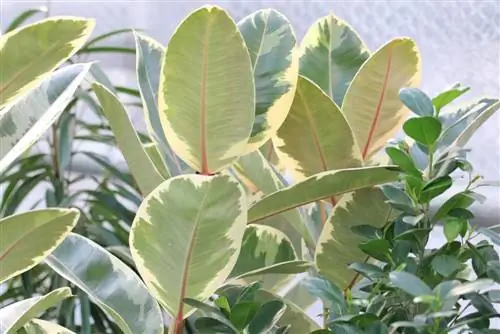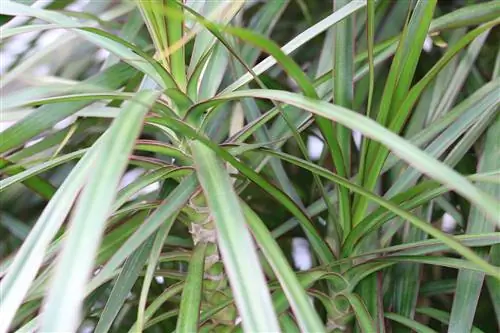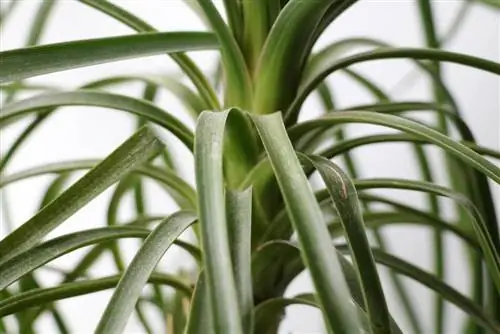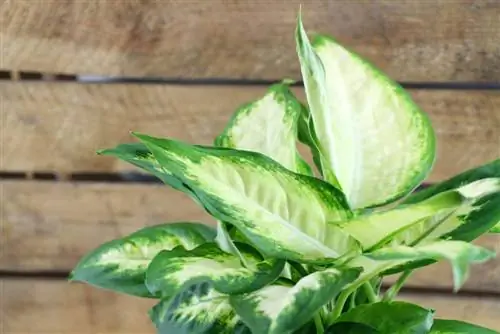- Author admin caroline@plants-knowledge.com.
- Public 2023-12-17 03:39.
- Last modified 2025-01-24 12:45.
No one can escape the magic of its evergreen, shiny green leaves. Ficus impresses with its opulent species and varieties as an elegant houseplant with indestructible robustness. As soon as the white milky sap escapes the pretty leaves, this circumstance raises the question: Is Ficus poisonous to people and pets? Here you will receive a well-founded answer, peppered with valuable information about the enchanting birch fig.
Slightly toxic to humans
All Ficus species contain a white milky sap. This is made up of various substances that have a negative effect on human physiology. These include the following ingredients:
Furocoumarins
These secondary plant substances are not only found in mulberry plants, such as the rubber tree. They are also found in citrus plants such as limes and lemons and are primarily used to ward off diseases and pests. If furocoumarins come into contact with human skin, which in turn is exposed to sunlight, burn-like symptoms develop. These range from mild skin redness to severe scarring. What is probably more serious is that this component of the milky sap of birch figs is suspected of being carcinogenic.
Flavonoids
The flavonoids are also secondary plant substances. These can be found universally in all ornamental and useful plants, where they sometimes serve as protection against feeding. As a result, they enter the human organism through food, where they only cause symptoms such as nausea and vomiting in an overdose. If there are small children in the household who explore their environment by putting everything in their mouths, caution is advised.
Rubber
Due to its rubber content, Ficus is often referred to as the rubber tree in common parlance. This ingredient is assigned allergenic properties. Anyone who is already struggling with a latex allergy should exercise particular caution when caring for birch figs. The extent of possible allergic reactions should not be taken lightly, as the spectrum ranges from mild skin redness to anaphylactic shock.
Tip:
If a small child has chewed on a birch fig leaf, he or she will quickly spit it out because the taste is not particularly pleasant. There is therefore no reason to panic. However, as a precaution, your family doctor should be contacted.
Recommended precautions
Considering that rubber trees are classified as slightly poisonous to humans, there is no need to avoid cultivating this decorative houseplant. If the following measures are taken, the potential danger is close to zero:
- Place the birch fig out of the reach of children
- Ensure that falling leaves don't end up in a child's mouth
- Wear protective gloves and long-sleeved clothing for all care and planting work
- Do not touch with bare hands in direct sunlight
- If in doubt, protect your eyes from splashing milky juice with safety glasses
If the milky juice gets on your clothing, we recommend washing it in the machine immediately so that the allergenic substance doesn't end up on your skin via this detour. Conventional detergents are usually not strong enough to completely remove dried plant sap. In this case, use an oxygen-based stain remover.
Highly toxic to pets
The ficus is classified as dangerously poisonous for dogs and cats. The same applies to birds, rabbits and other rodents. If your pets nibble on the leaves, they will suffer poisoning, which manifests itself in the form of vomiting, cramps, diarrhea and even death from respiratory paralysis. If there is no possibility of placing the rubber tree out of the reach of pets, you should refrain from purchasing it.
First aid measures for animals
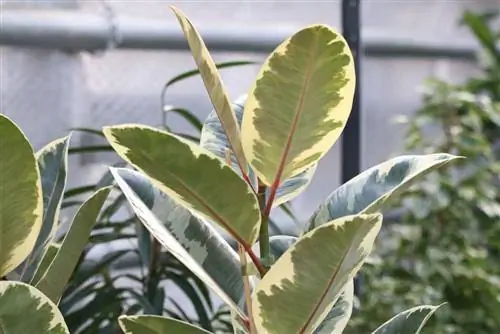
If a pet eats the leaves of a birch fig, the symptoms of poisoning manifest themselves to varying degrees. While just 3 leaves can be fatal for a dwarf rabbit, this is not the case for a German Shepherd. Do not attempt treatment on your own, as symptoms such as vomiting and diarrhea may indicate completely different causes of the disease. Therefore, visit the vet as soon as possible and take some leaves of the plant in question with you.
Ficus as a medicinal plant
The other side of the coin of a birch fig should not be ignored at this point. In addition to its decorative silhouette, the houseplant scores with he alth-promoting attributes. In Asia, for example, the leaves of the Ficus benjamina are used in folk medicine to relieve rheumatic joint pain or swelling. The outstanding aspects are explained in more detail below:
Strengthens the immune system
If a rubber tree is cultivated as a houseplant, it counteracts dry indoor air. This property increases resistance to colds, especially during the cold season, because the mucous membranes of the respiratory tract remain moist. This has the advantage that viruses hardly have a chance of penetrating the human organism.
Cleans the air we breathe
Furniture, carpets and wallpaper contain toxic substances that are constantly released into the air we breathe in small quantities. The best-known poison is formaldehyde, which is still contained in many wooden furniture today. The rubber tree filters up to 80 percent of these toxins from the air. This is achieved thanks to plant enzymes that quickly convert toxic substances into harmless amino acids and sugars. More and more employees are using this beneficial effect in offices, because the air here is often polluted by fine dust that escapes from printers or copying. As a result, people are less likely to complain of headaches or shortness of breath. This releases hidden energies that have a positive impact on the daily workload.
Conclusion
The question is definitely justified: Is Ficus poisonous to people and pets? In fact, the white milky juice contains various substances that are slightly toxic, especially to small children, if consumed. Given the unpleasant taste, it will stick to a maximum of one leaf; However, if he alth problems arise, such as nausea or vomiting, you should consult your family doctor immediately. For adults, when handling birch figs, there is a risk that the toxic milky sap will trigger an allergic reaction. Wearing protective gloves, long-sleeved clothing and glasses should therefore be a given when touching the plant. However, contact with the leaves of a rubber tree is extremely dangerous for pets. Cultivating Ficus within reach of pets is therefore not recommended.

